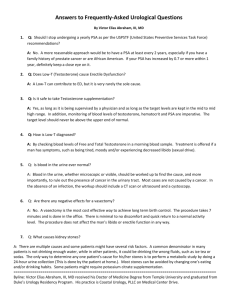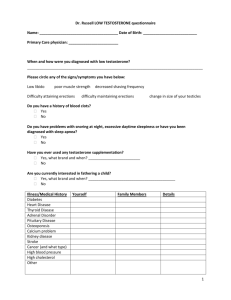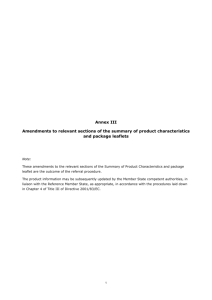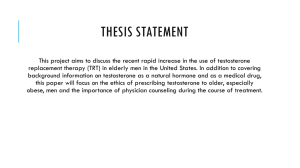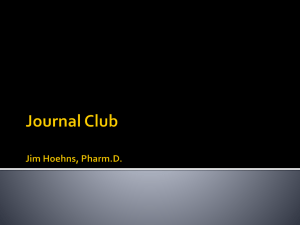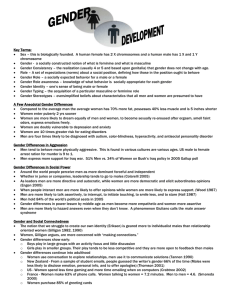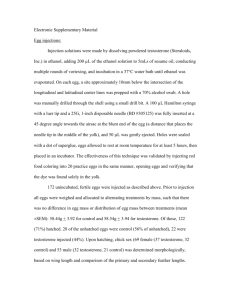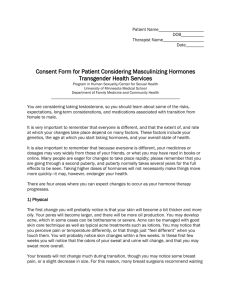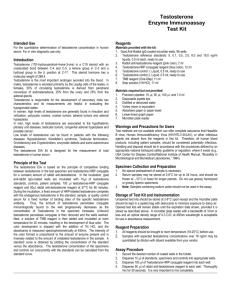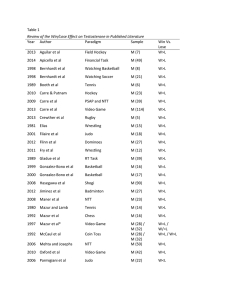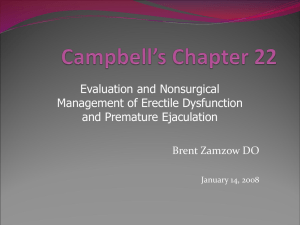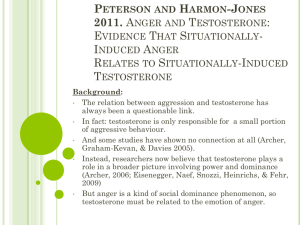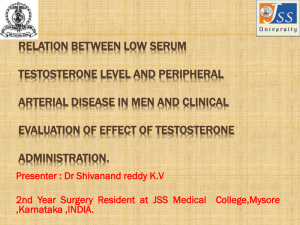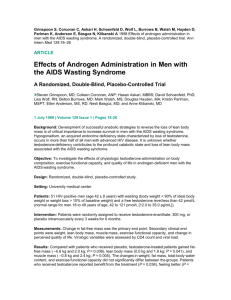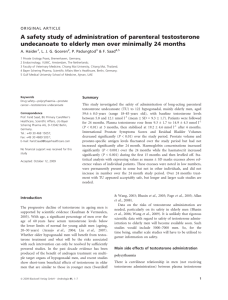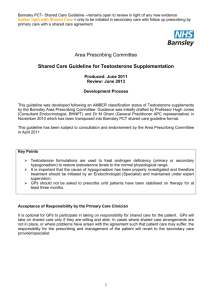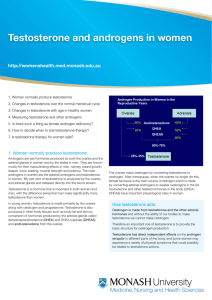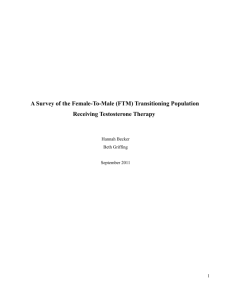ADVICE FOR PATIENTS RECEIVING TESTOSTERONE THERAPY
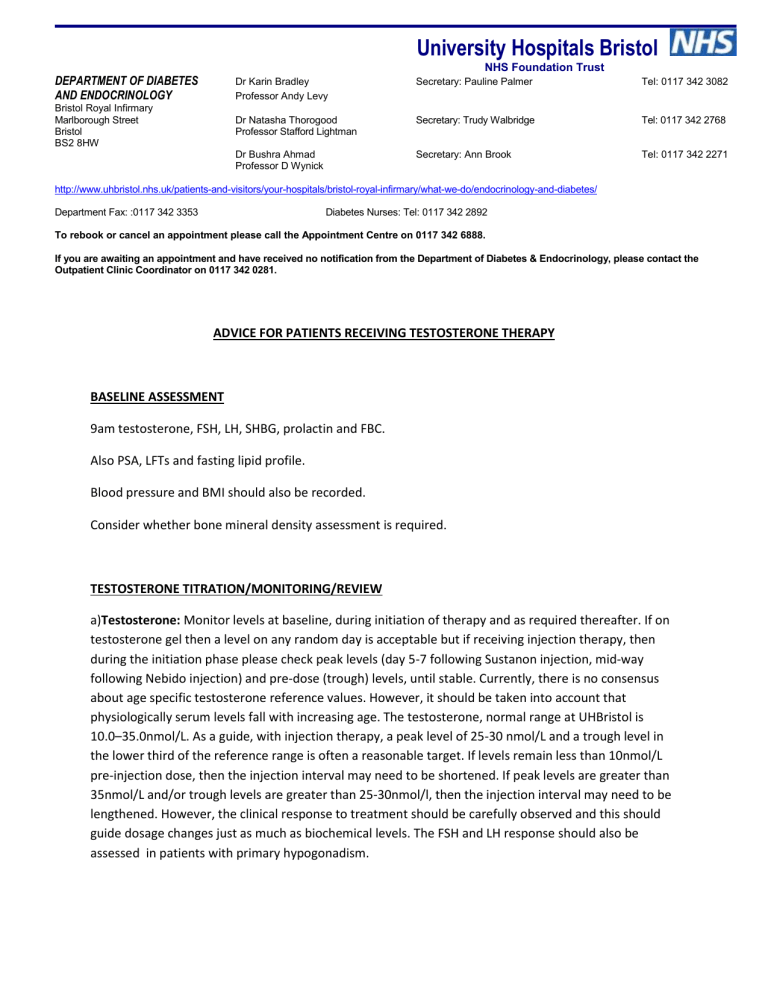
University Hospitals Bristol
NHS Foundation Trust
DEPARTMENT OF DIABETES
AND ENDOCRINOLOGY
Dr Karin Bradley
Professor Andy Levy
Secretary: Pauline Palmer Tel: 0117 342 3082
Bristol Royal Infirmary
Marlborough Street
Bristol
BS2 8HW
Dr Natasha Thorogood
Professor Stafford Lightman
Dr Bushra Ahmad
Professor D Wynick
Secretary: Trudy Walbridge
Secretary: Ann Brook
Tel: 0117 342 2768
Tel: 0117 342 2271 http://www.uhbristol.nhs.uk/patients-and-visitors/your-hospitals/bristol-royal-infirmary/what-we-do/endocrinology-and-diabetes/
Department Fax: :0117 342 3353 Diabetes Nurses: Tel: 0117 342 2892
To rebook or cancel an appointment please call the Appointment Centre on 0117 342 6888.
If you are awaiting an appointment and have received no notification from the Department of Diabetes & Endocrinology, please contact the
Outpatient Clinic Coordinator on 0117 342 0281.
ADVICE FOR PATIENTS RECEIVING TESTOSTERONE THERAPY
BASELINE ASSESSMENT
9am testosterone, FSH, LH, SHBG, prolactin and FBC.
Also PSA, LFTs and fasting lipid profile.
Blood pressure and BMI should also be recorded.
Consider whether bone mineral density assessment is required.
TESTOSTERONE TITRATION/MONITORING/REVIEW a)Testosterone: Monitor levels at baseline, during initiation of therapy and as required thereafter. If on testosterone gel then a level on any random day is acceptable but if receiving injection therapy, then during the initiation phase please check peak levels (day 5-7 following Sustanon injection, mid-way following Nebido injection) and pre-dose (trough) levels, until stable. Currently, there is no consensus about age specific testosterone reference values. However, it should be taken into account that physiologically serum levels fall with increasing age. The testosterone, normal range at UHBristol is
10.0–35.0nmol/L. As a guide, with injection therapy, a peak level of 25-30 nmol/L and a trough level in the lower third of the reference range is often a reasonable target. If levels remain less than 10nmol/L pre-injection dose, then the injection interval may need to be shortened. If peak levels are greater than
35nmol/L and/or trough levels are greater than 25-30nmol/l, then the injection interval may need to be lengthened. However, the clinical response to treatment should be carefully observed and this should guide dosage changes just as much as biochemical levels. The FSH and LH response should also be assessed in patients with primary hypogonadism.
b) Haematocrit: Polycythaemia has been associated with testosterone replacement. Monitor levels at baseline and post initiation of therapy. If haemoglobin greater than 18 g/dL or haematocrit >0.5L/L then recheck and consider dose reduction, withdrawal of therapy or discuss venesection. An annual FBC is recommended. c)Liver Function Test: Monitor levels at baseline and consider ongoing monitoring if clinically appropriate. d) PSA: Testosterone replacement does not cause prostate cancer but potentially adminstering androgens to someone who develops such a malignancy for another reason may result in accelerated cancer growth. Hence, despite being an imperfect screening tool PSA is frequently measured in patients on testosterone replacement therapy. This, however, remains controversial and after an informed discussion some patients may opt out of this screening. If screening continues then monitor PSA at baseline and annually. If PSA is elevated above the age appropriate range then exclude UTI and question patient regarding any prostatic symptoms. Consider stopping treatment and refer to urology if PSA remains elevated. e) Lipid Profile: Testosterone replacement is known to reduce total cholesterol, low density lipoprotein
(LDL), and high density lipoprotein (HDL) levels. Consider monitoring levels at baseline and annually. An abnormal lipid profile, prior to or during testosterone treatment, should be investigated and treated in the context of overall health and cardiovascular risk by the clinician responsible. Any significant worsening of the lipid profile on testosterone therapy should result in reassessment.
After stabilisation some patients will be discharged from the Endocrine outpatients’ clinic back to primary care. An annual review is recommended in primary care with the focus on sexual function, mood and energy levels as well as bone health and prostatic symptoms in addition to the biochemical monitoring suggested above. Please re-refer to endocrinology as required.
With Kind Regards
The Endocrine Team
